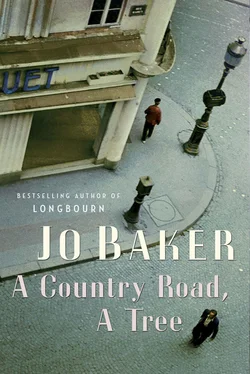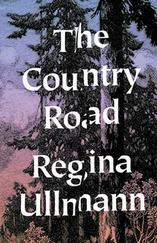This waiting; this attentisme. It has become a deliberate decision. Everyone is waiting to see how grand events will fall before they’ll take a position, or do anything about anything at all. This is the politics of passivity, and it makes sense. But it is unconscionable. It is not to be borne.
He turns away from the window and clumps down the stairs. Suzanne, at that same moment, is coming in through the back door, her nose pink, her hands clamped under her armpits. There is a brightness about her that he hasn’t seen in a long while.
“You like it?” he asks.
“Yes,” she says. “It will do very well.”
Yvonne and Marcel Lob come in behind her, crowd out the doorway’s light.
“One thing you’ll have to be sure of is a good supply of fuel,” the professor explains, as if this needed explanation. “It’ll be cold, a place like this, standing all alone. You could freeze to death out here, this winter.”
—
The wind is bitter; it makes him squint.
He eyes the copse of holm oak. In girth and stature, compared with the common variety, these oaks are barely more than weeds. There are half a dozen or so of them to be cut down, and the wood sawn and split and stacked on to a cart. He’ll get it done in a day, he reckons. He has been promised half of the wood in exchange for his work. The little copse means heat and cooking and warm water for the months to come.
They’d gathered wood in the park, they’d broken branches and filched planks. But he’s never cut down a tree before.
Still. How hard can it be?
He hefts the axe, swings it. It whacks against the trunk. The haft judders in his hands; the jolt of it travels up his arms and into his shoulders. The twigs shiver, the blade leaves a narrow split in the bark; and that is all.
He sets the axe down on its head, spits on his palms and rubs them together.
He lifts the axe and swings again. The bark opens a little wider.
He takes the coat off and lays it aside.
Later, he takes his jacket off and drops it on top of the coat.
Then he takes off his sweater and his shirt, and lobs them in the direction of the clothes pile. He works on in his singlet, the wind and winter sun creasing up his eyes.
His arms ache. His shoulders ache. His back aches.
It’s a different ache from usual. It’s not the stiff neck and tired eyes of before, not the tight cramp of study and neglect. And his head begins to clear; his thoughts are smoothed out and they begin to run. There are no knots. No tangles. No sudden snags. There’s just the swing of the axe, and the shift and twist of muscle, and the breath in and out of him, and the catch of it, of a deeper breath than usual, on his scar, like the tick forward of a second hand.
He works.
He is at Cooldrinagh, swaying high in a treetop, watching his mother cross the ground beneath him, her shins whacking against the sail of her skirt. He is huddled in his chair in the darkness of his college rooms, cold, deliberately alone. He is drifting in a morphine glow through billowing white curtains, and a line of pain that the blade made in him, waking now to the uneasy thrill of Shem’s face, and now to the new comfort of Suzanne’s, and now to his mother’s pinched visage. He is in that little café on the rue des Vignes watching Shem talk as though the world falling into ruins were some grand conspiracy against him. Two years he’s gone now, maybe even to the day — a sting to realize that things are slipping, blurring: he has lost track and doesn’t know the date. And if Shem had not died, and if he had fled south rather than to Switzerland, if he were here now, he’d have spread a handkerchief on the bank there and sat himself down on it, ankle on knee, dark glasses covering his eyes, hands folded on the head of his cane, hat tamped down, his good coat laid around his shoulders, watching him work. And he’d be griping. Small-town life, dear God, how does anybody stand it! The dogs following him around, and the food, and the state of his boots on these dreadful roads. C’mon now, c’mon for a glass of wine and a bite of dinner and a few songs, why don’t you? There must be somewhere in town where his name is still worth something, where a friend might stand him a drink, where he can caress a piano’s keys and sing a few old songs.
He glances down at his palms, at the puffs of unburst blisters, the seams of sweaty dirt, the puckered scar across his thumb where the knife had slipped. You wouldn’t catch Mr. James Joyce getting his hands roughened. Getting them dirty. At least, not this kind of dirt.
By nightfall, there’s a stump in the red earth. It twists its roots deep into the rocky soil.
He has started work on the second tree; he has taken a sappy, smashed bite out of its base. It shudders when he hits it.
—
He is splitting logs. There is rhythm to this work. His breath plumes and fades, plumes and fades.
The house is silent; Suzanne is out at Saint-Michel, playing the piano. The light lowers, the shadows lengthen, and there is, far off, the sound of an engine from the Apt road. The axe stilled, he listens. The rumbling grows; there is more than one engine. Diesel, heavy, getting closer. He whacks the axe into the chopping block, wipes his palms down his trousers. Gooseflesh prickles on his arms.
Because the roads are so quiet nowadays. Cars moulder in barns. Tractors serve as chicken roosts. Delivery trucks are solitary and infrequent. Bicycles are as cherished as firstborn sons, because there is no fuel now, not for ordinary people. There is only fuel for the government, the Army and the Geste.
He slips round the side of the house and peers out along the road. The rattle of the engines grows, and now there is the gritty peel of the tyres. And then, at the turn, light: the fence is illuminated in stark lines. The headlamps are sloped low and shaded for the blackout. There is no pause at the junction: the vehicles turn towards him with brutal self-assurance. They are passing now, shaking the ground beneath his feet, and he steps back deeper into the shadows, and the trucks thunder into town.
Round the back of the house again he snatches up the coat and drags it on. Suzanne, fingertips shifting their gentle pressure from key to key — no way to get word to her. And in town, the newcomers vanishing as the trucks appear; people slipping down alleyways and up flights of stairs and in through garden gates. If the trucks pull up outside the hotel, if soldiers descend and slam open doors and demand papers. So many people are so vulnerable there.
And if the troops are sent back out this way, to find the Irishman. It would only take a word.
He flits on into the woods, the ground rising, so that he is scrambling up, on hands and feet, through rocks and fallen pine needles. The stream of headlights continues off to his left. The trees baffle the sound and distort it, seeming close, then distant, then right up by him once again. He pulls himself up over roots and shivering dry scree until he reaches the top of the outcrop. His breath hurts; it catches on his scar. He squats down, his back against a tree, and stares out towards the town. He lights a cigarette and shakes out the match and squeezes the black tip till it is cool. He holds the match cupped in his palm: the woods are dry as tinder, even at this time of year. He watches the lights, the flick and smudge of them through the town, and smokes, his hand shaking. Then the lights slither off, along the road that curves away and descends steeply to the valley, and away, and they fade off into the distance. He taps ash into his hand and rubs his palms together. Cigarette clamped between his lips, he gets to his feet and begins the ungainly slither back downhill.
—
Heron-like, he hunches over his manuscript. He holds his pen in calloused fingertips.
Читать дальше










